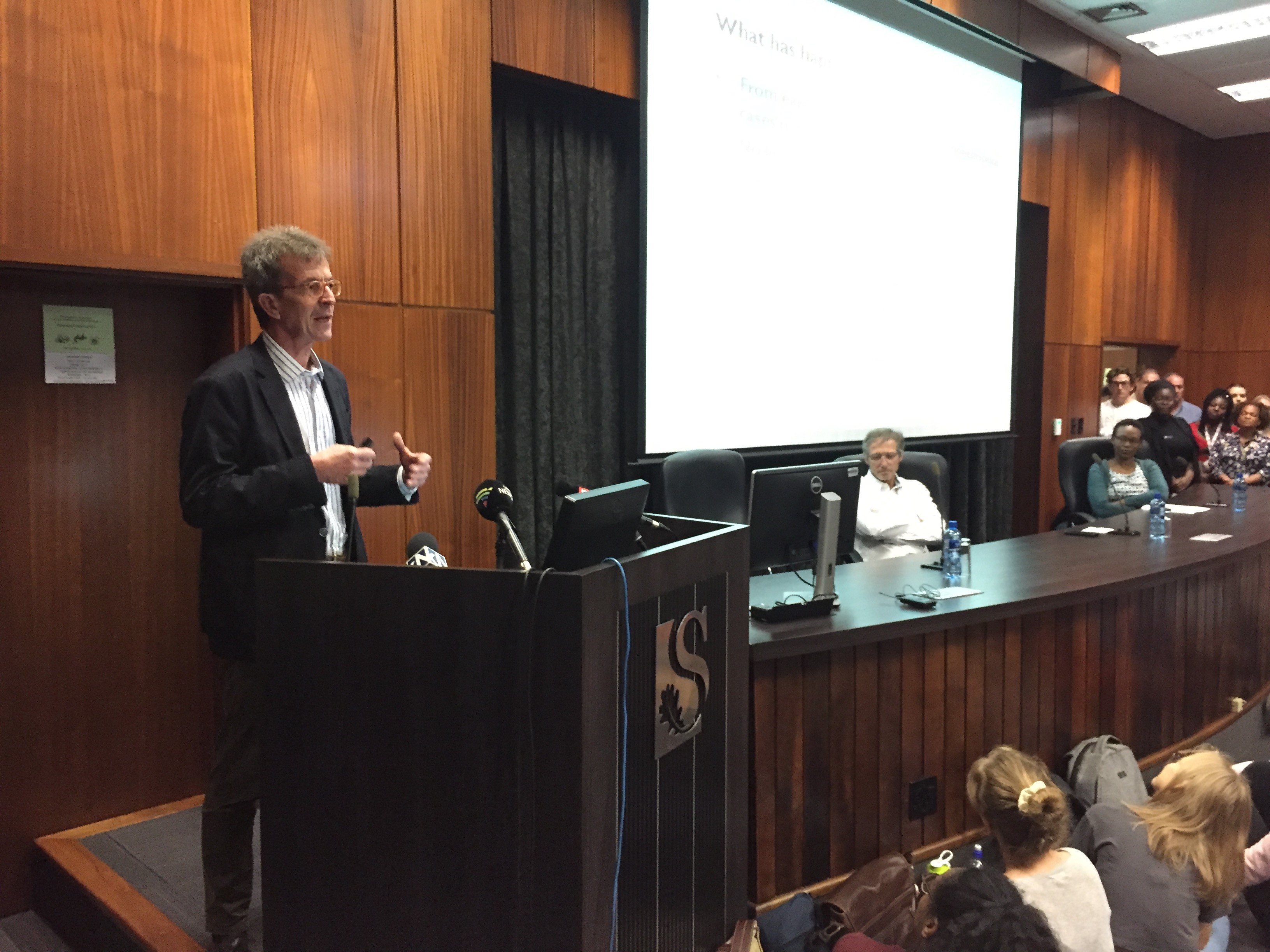The Faculty of Medicine and Health Sciences at Stellenbosch University hosted a lunchtime seminar during which virology and infectious disease experts briefed the media, staff and students on the novel coronavirus. 
The information session, entitled 'The coronavirus from Wuhan – what to expect in South Africa' was held in the packed JN de Villiers boardroom. Prof Wolfgang Preiser (Medical Virology), Dr Jantjie Taljaard (Adult Infectious Diseases) and Dr Nokwazi Nkosi (Medical Virology) explained the origin and clinical presentation of the disease, and unpacked the measures that are in place to manage and treat the disease, should it present in South Africa.
Click here to listen to a podcast of the entire information session, or watch a video recording here.
Below is a fact sheet to with useful information about the virus:
FACULTY OF MEDICINE AND HEALTH SCIENCES
STELLENBOSCH UNIVERSITY
FACT SHEET
ISSUED: FRIDAY, 31 JANUARY 2020
The new coronavirus from Wuhan – what to expect in South Africa
In early December 2019, cases of pneumonia started occurring in the city of Wuhan in China that were not caused by any known virus. At the end of that month, Chinese authorities confirmed that an outbreak was happening and that they had closed down a seafood and wildlife market suspected to be linked to it. A week later, the discovery of a previously unknown virus was announced – a coronavirus, which is a family of viruses that include the common cold, SARS and MERS. The new virus was temporarily named “2019-nCoV" and is often referred to as the novel coronavirus.
Any new virus is a concern as health care providers have very limited knowledge of how it affects people or how best to manage it.
Early on during the outbreak, many of the patients in Wuhan reportedly had links to the animal market, suggesting zoonotic transmission from an unknown type of animal to people. However, a growing number of patients have not had such exposure to animals, indicating person-to-person spread is occurring. Healthcare-associated transmission has also been reported. Since then, the disease has been detected in most parts of China and in several countries around the globe, usually affecting travellers from areas with documented cases of 2019-nCoV, or people who have come into contact with such travellers.
How it spreads
As new research about the novel coronavirus is still emerging, it is thought that person-to-person infection occurs via respiratory droplets produced when an infected person coughs or sneezes – similar to how influenza and other respiratory pathogens spread. Symptomatic patients present the highest risk for infection, but there are also unconfirmed reports of transmission taking place during the incubation period.
What are the signs and symptoms?
Patients with 2019-nCoV have mainly presented with the following symptoms:
- Fever;
- Cough; and
- Shortness of breath.
The infection can present as a fairly mild respiratory illness, but in severe cases may lead to pneumonia and even death. Elderly people and those with underlying illness seem to have a higher risk of severe illness and death. It is unknown whether asymptomatic infections occur.
Advice to the public
The risk of infection with the novel coronavirus in South Africa is very low at present (31 January 2020). Possible suspected cases (as defined by the National Institute for Communicable Diseases, NICD) are tested and placed in precautionary isolation.
If you feel ill, and have been to China in the past few weeks, or have had contact with someone who was there, please seek medical attention urgently, stating clearly your exposure and symptoms.
Common hygiene practices can minimise your risk of infection or spreading the disease to others:
- Frequently wash your hands using alcohol-based hand sanitisers or soap and water.
- Cover your mouth when coughing or sneezing.
- Stay at home if you have a fever or cough.
- Reconsider travel plans if possible to areas that have been affected by the outbreak.
Sources:
World Health Organization; Centres for Disease Control and Prevention; NICD; National Department of Health – Minister of Health Opening Statement on Coronavirus

